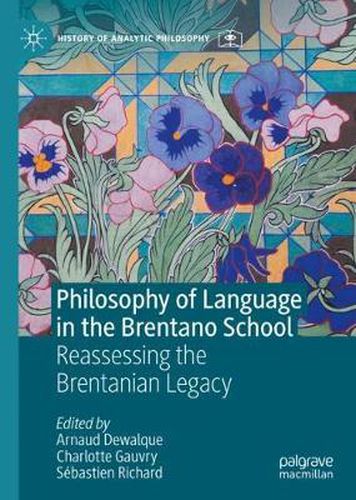Readings Newsletter
Become a Readings Member to make your shopping experience even easier.
Sign in or sign up for free!
You’re not far away from qualifying for FREE standard shipping within Australia
You’ve qualified for FREE standard shipping within Australia
The cart is loading…






This title is printed to order. This book may have been self-published. If so, we cannot guarantee the quality of the content. In the main most books will have gone through the editing process however some may not. We therefore suggest that you be aware of this before ordering this book. If in doubt check either the author or publisher’s details as we are unable to accept any returns unless they are faulty. Please contact us if you have any questions.
This collection of fourteen original essays addresses the seminal contribution of Franz Brentano and his heirs, to philosophy of language. Despite the great interest provoked by the Brentanian tradition and its multiple connections with early analytic philosophy, precious little is known about the Brentanian contribution to philosophy of language. The aim of this new collection is to fill this gap by providing the reader with a more thorough understanding of the legacy of Brentano and his school, in their pursuit of a unique research programme according to which the analysis of meaning is inseparable from philosophical inquiries into what goes on in the mind and what there is in the world.
In three parts, the volume first reconstructs Brentano’s pathbreaking thoughts on meaning and grammatical illusions, exploring their strong connections with the Austro-German tradition and analytic philosophy. It then addresses the multifaceted debates on the objectivity of meaning in the Brentano School and its aftermath (Meinong, Husserl, Ingarden, Twardowski and the Lvov-Warsaw School). Finally, part three explores Brentano’s wider legacy, namely: Husserl’s theory of modification and typicality, Buhler’s theory of linguistic and non-linguistic expressions, and Wittgenstein’s thoughts on guidance and rule-following.
The result is a unique collection of essays which shows the significance, originality and timely character of the Brentanian philosophy of language.
$9.00 standard shipping within Australia
FREE standard shipping within Australia for orders over $100.00
Express & International shipping calculated at checkout
This title is printed to order. This book may have been self-published. If so, we cannot guarantee the quality of the content. In the main most books will have gone through the editing process however some may not. We therefore suggest that you be aware of this before ordering this book. If in doubt check either the author or publisher’s details as we are unable to accept any returns unless they are faulty. Please contact us if you have any questions.
This collection of fourteen original essays addresses the seminal contribution of Franz Brentano and his heirs, to philosophy of language. Despite the great interest provoked by the Brentanian tradition and its multiple connections with early analytic philosophy, precious little is known about the Brentanian contribution to philosophy of language. The aim of this new collection is to fill this gap by providing the reader with a more thorough understanding of the legacy of Brentano and his school, in their pursuit of a unique research programme according to which the analysis of meaning is inseparable from philosophical inquiries into what goes on in the mind and what there is in the world.
In three parts, the volume first reconstructs Brentano’s pathbreaking thoughts on meaning and grammatical illusions, exploring their strong connections with the Austro-German tradition and analytic philosophy. It then addresses the multifaceted debates on the objectivity of meaning in the Brentano School and its aftermath (Meinong, Husserl, Ingarden, Twardowski and the Lvov-Warsaw School). Finally, part three explores Brentano’s wider legacy, namely: Husserl’s theory of modification and typicality, Buhler’s theory of linguistic and non-linguistic expressions, and Wittgenstein’s thoughts on guidance and rule-following.
The result is a unique collection of essays which shows the significance, originality and timely character of the Brentanian philosophy of language.